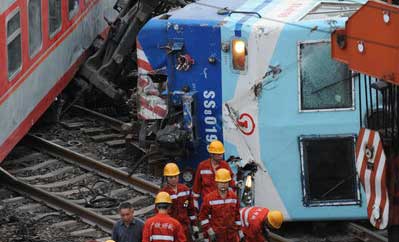 |
|
Employees of the Chenzhou Railway Station of Hunan province yesterday clear the site where two trains collided on Monday, killing three and injuring 63.?[Photo: CFP] |
One of the two trains involved in a collision in Chenzhou, Hunan province, that killed three people and injured 63 on Monday, had suffered a "brake failure", a railway official said yesterday.
Sun Jing, deputy general manager of the Guangzhou Railway Group, which operates both the trains, said the brakes of the train traveling from Changsha to Shenzhen had failed, causing it to enter the Chenzhou railway station at a speed of 55 kph.
"The train then broke the railroad switch and crashed into another Shenzhen-bound train, which was just readying to leave the railway station," he said.
The massive impact derailed the engine and first five compartments of the Changsha train and two compartments of the static train that had started its journey from Tongren, Guizhou province.
Sun submitted a report of his findings to the State Administration of Work Safety yesterday, web portal www.people.com.cn.
But he did not explain the reason for the brake failure.
Liang Jiakun, deputy director of the State Administration of Work Safety, urged the railway department to carry out a thorough investigation into the incident to ensure such disasters do not recur.
Chen Hualan, director of the Ministry of Railways' department of work safety, said they had launched a probe into the accident but details of their findings would not be disclosed until the investigation was complete.
The identities of the three people who died in the tragedy are still not known. Local media reported yesterday all of the deceased are women.
The ministry said that rail traffic on the Beijing-Guangzhou line had not been stopped due to the accident.
But several Guangzhou-bound trains ran late, with the longest delay of nine hours, media reported.
A ministry official declined to reveal the economic loss caused by the collision.
Authorities at the Chenzhou railway station on Monday refunded passengers whose trains were affected by the collision.
A railway station spokesman said at least "4,000 passengers" were refunded.
(China Daily July 1, 2009)